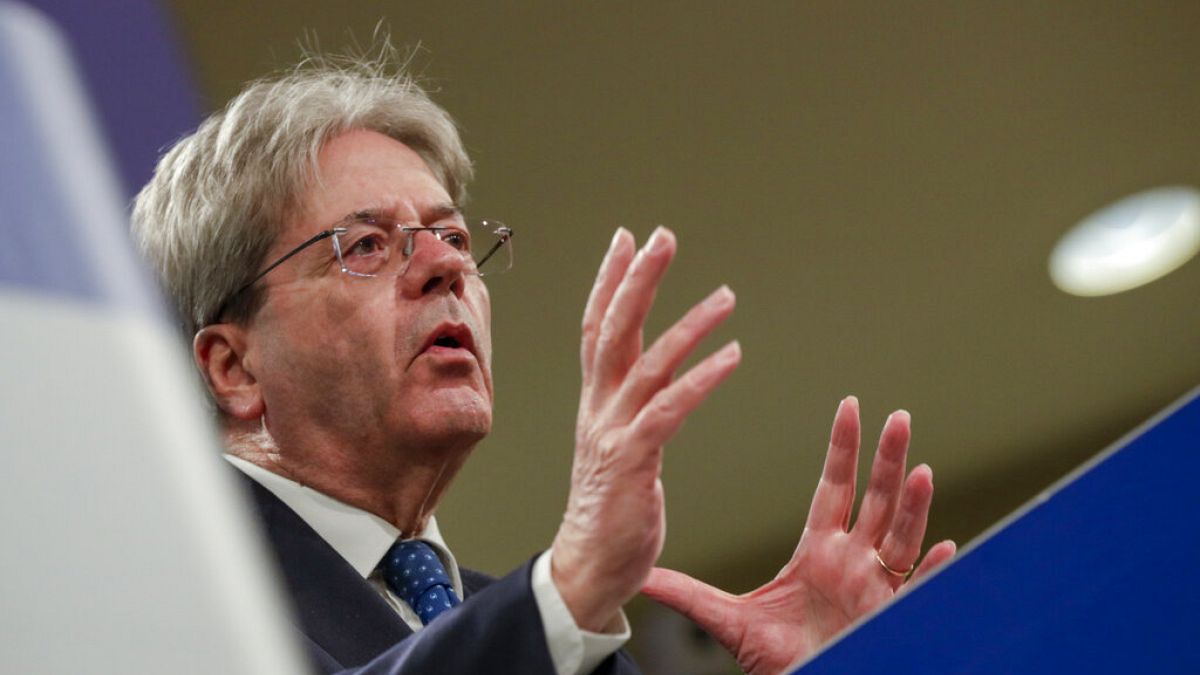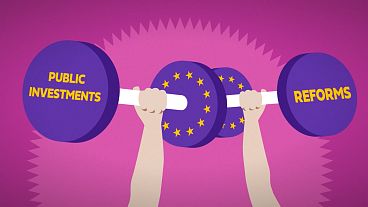The 100% debt-to-GDP ratio will be the legacy of the huge borrowing undertaken to cushion the impact of the coronavirus lockdowns.
For the first time ever the debt of eurozone countries will this year likely become equal to their combined wealth, the EU's economy chief said on Wednesday.
The 100% debt-to-GDP ratio will be the legacy of the huge borrowing undertaken to cushion the impact of the coronavirus lockdowns.
"We will have probably this year around 100% of debt to GDP in the euro area which is very high and unprecedented," Paolo Gentiloni, the EU commissioner for the economy, told Euronews.
"This is not an enormous problem nowadays with such low interest rates and the activity of the European Central Bank, etc.
"But the problem of high debt in the mid-term should be addressed. It's not something that, especially countries with very high debt, can forget. The problem is there."
The commissioner specified that the debt increase "is involving all member states".
Belgium, Spain, France, Cyprus, Portugal, Italy and Greece are already above the 100% threshold. In the case of Greece, the level stretches to the 200% mark.
Government debt in the eurozone has never been so high, not even during the worst years of the European sovereign debt crisis when the very future of the euro was thrown into doubt. Back then, the ratio never surpassed the 90% barrier.
But the brutal shock of the pandemic and the sudden imposition of lockdowns forced EU countries to take exceptional measures in order to save businesses from ruin, guarantee salaries of furloughed employees and prevent long-lasting damage.
Debt grew at an unstoppable pace last year. At the end of the third quarter of 2020, the proportion was already record-breaking, standing at 97.3% – almost twelve points higher than it was in the same period of 2019 when it stood at 85.8%.
"If we compare these very high levels to other advanced economies, for example, the average of the OECD, this 100% [debt-to-GDP ratio] is not so high. We have an even higher level in the rest of the OECD," the commissioner said.
Extended suspension of fiscal discipline
Gentiloni's gloomy forecast comes as the European Commission made official its decision to extend the suspension of the EU's strict fiscal rules for the remaining of 2022.
The EU's fiscal discipline is regulated by the Stability and Growth Pact (SGP), which requires members states to implement policies to keep their deficit under 3% of GDP and debt under 60%.
But the pact, which has been criticised in the past for its stringency and inflexibility, includes a so-called "general escape clause" that allows member states to undertake budgetary measures "in times of severe economic downturn". In practice, this means the suspension of the SGP requirements.
The activation of the escape clause was announced by European Commission President Ursula von der Leyen during a video conference with EU leaders in mid-March 2020 and has been in place ever since, giving governments a free pass to borrow and causing debt to skyrocket.
The Commission will deactivate the clause only when the level of economic activity in the EU or eurozone is comparable to that of pre-crisis levels (end of 2019). If the bloc's economy has not yet recovered, the escape clause could be further extended in 2023.
Commissioner Gentiloni is confident that a strong rebound will be underway in the EU by the middle of this year, but he warns the process will remain "uneven".
"We have sectors that will remain maybe for a longer period in difficulty, and others, like manufacture, that are already running at the level before the crisis. We will have differences," he said.
Brussels is counting on the EU's recovery fund (Next Generation EU) to hold back the mounting debt. The fund will provide €312.5 billion in grants and up to €360 billion in loans to member states with the aim of kickstarting their economies. Expenditure financed by grants, the Commission notes, won't increase national deficits or debt.
Public debt across the bloc has reached such shocking levels that some economists are demanding the European Central Bank, which holds a significant part of it, to cancel it altogether. Christine Lagarde, the ECB chief, has categorically rejected the idea, calling it "unthinkable".
"[Cancelling debt] would be a violation of the European treaty which strictly forbids monetary financing of states," Lagarde told a French newspaper in February.
Asked about the thorny question, Gentiloni preferred to focus the conversation on his own tasks as commissioner.
"I'm not entering into what is or is not the mandate of the ECB. But from my point of view, what we should work on is the relation between the debt and our fiscal rules in the Union."



